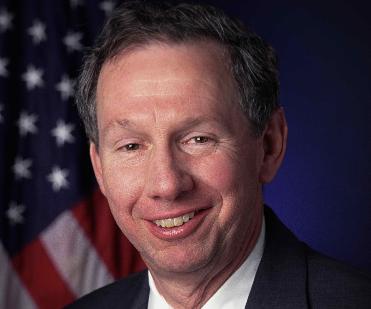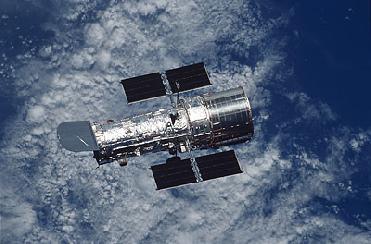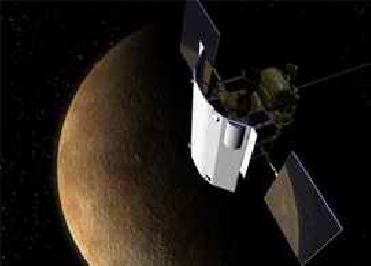
Following is the full text of the remarks made by NASA administrator Michael Griffin at NASA's 50th anniversary gala on September 24:
Thank you, Leon, and thanks to all of you for being here tonight. This is indeed a very special evening. When I think of having to stand up here and follow John Glenn and Neil Armstrong, that could be a little intimidating, even for me, and I'm not known for being easily intimidated. So I just remind myself that all I'm really doing is following a guy who was a former contestant on Name That Tune and another guy who was once a deputy associate administrator for aeronautics at NASA, right? So no big deal.
Before I get started, I have my little list here of people that need thanks from NASA for helping us have this celebration. We can't spend public funds on this kind of an activity as I'm sure all of you know, and so the funding comes from our industrial base – Boeing and Lockheed and ATK and every other company that was mentioned, USA – all of our contractors who contribute toward this. The event itself was orchestrated by AIAA as has been mentioned. I'm sorry that I was not able to personally take part in helping to steer it.
It seems that because I wrote a textbook a few years back that the AIAA publishes that I'm recused from dealing with the AIAA while I'm administrator, and so my deputy administrator, Shana Dale, who was mentioned earlier, made all the difficult decisions in orchestrating this event with AIAA. And of course, on the ground, the folks who made it come true, folks like Bert Ulrich, Sheree Stovall-Alexander, their PAO team, Teresa Grimes, who somehow scrounged out all of your current addresses – some of you are not easy to find. My own Rolodex came into play more than once. Those people are the ones who pulled all of this together and the rest of us are just the beneficiaries of their hard work. Especially, of course, I want to thank John [Glenn] and Neil [Armstrong] for coming here and doing this. Thank you.
Every astronaut who ever flew with us, whether a U.S. astronaut or not, was invited to this celebration, but none are greater in their accomplishments than John and Neil. The demands on their time are voracious. They are very, very public people because of what they have done and they have borne the burdens of those public lives they live with a grace and an equanimity that most of us can only aspire to. I thank both of you for being here tonight.
One thing that is very enjoyable about our 50th birthday, our 50th anniversary, is that we're still young enough to be able to interact with those, not only our astronauts, but also our flight engineers, those on the ground, who helped bring it together. We're still young enough to be able to interact with many of the folks who started out with us and, for me, in my career, to be able to be mentored and taught by such people has been one of the greatest benefits that I've had.
It is an honor to be here tonight. I'm doing the job that I aspired to hold as a child. Many of you have heard me say that I was interested in space and space travel before there was a Sputnik. And so I watched with bated breath as those who were a few years older put some of those dreams into practice in some of the videos that we saw earlier, and it's a thrill for me to be leading the agency today despite the trials and tribulations that it takes. And so thanks to all of you for coming here tonight to help celebrate Becky's and my anniversary. I can't leave the theme of anniversaries without mentioning that it's also the birthday of someone who is a dear friend to many of us and a close colleague to some of you, John Young. It's John's 78th birthday today. I wish he could have been here tonight. I often say that John Young befriended me before I was anybody, so I have always very much appreciated that.
NASA today is doing well. I believe that we are doing well. I believe the evidence before us supports that. We're in the final stages of completing the International Space Station -much tougher than we ever thought it would be for many reasons lying entirely outside the technical, but we're getting there. And when we are done, it will be a scientific and engineering accomplishment beyond anything yet achieved by the human race. On other fronts, we just soft-landed on Mars for the third time in history this past Memorial Day. It was an exciting of an event as I have ever been able to witness. We still have two rovers running around Mars as we speak today. I spoke the other day with one of the folks who earns his living by driving a rover on Mars. It's a tough job but somebody has got to do it.
The Dawn spacecraft is on the way to the major asteroids in the asteroid belt. We have no idea what we'll learn there. We can be certain that we'll learn things that we didn't know.
New Horizons is on its way to Pluto. Messenger is on its way to Mercury. And Stereo, a twin pair of spacecraft, are on their way to positions where they can image the sun simultaneously with a stereo view to learn how the engine which drives our climate behaves. And regarding our climate, we are being observed by more Earth satellites than I care to count, among them Terra and Aqua. Terra was managed by the man who is my associate administrator today, Chris Scolese, another to whom we owe a great debt.
So NASA is doing well. I think we will continue to do well. Elsewhere, I have written after a lot of the very careful geeky analysis for which I am known, that with our present budgets in fixed dollars, constant dollars, inflation-adjusted dollars, if we can stay the course, when it comes time to have that 100th birthday that Neil spoke of, that we can be looking back on the 20th anniversary of the first Mars landing. I know that to be true. It's available in the technology and it's available in the budget, but it requires that we act with unusual persistence for Americans and that we stay the course, and that we stay true to what it is we believe the proper goals are for our agency into our children's and grandchildren's time. I think there are lessons from today in what happens when we lose that focus. We are doing very well today, but as you walk out of this museum, I would like for to take a look at the SR-71 [aircraft]. We don't have one of those anymore.
Tonight, I'm wearing a tie which shows an astronaut in a Manned Maneuvering Unit flying around. And it shows an Apollo lander on the moon and there are two Apollo spacecraft. We don't have those anymore either. You can go see them in museums.
Now, there's nothing odd about looking at 40-year-old hardware in museums and admiring it and respecting it and respecting those who brought it into being. Indeed, that's why we have museums and that's what they're for. We should do that. What looks easy to us today was not easy the first time it had to be done. But only in American aerospace, of which I am aware, can we go to a museum and look at certain artifacts and wish that we could still do as well. And that fact should sober everyone here, in my opinion. Next week, if their plans go well, and they don't have an undue amount of weather delays, the Chinese will launch the first three-man spacecraft. At that moment, they will outnumber the number of Americans and the number of Russians in space, and in fact, there will be as many Chinese in space as there are Russians and Americans put together. Good on the Chinese. I will cheer for them. I wish them well. I wish that we were more prominently numbered among those who are in space and that we were reaching farther and doing more.
In contrast, the victories that I am striving for as we speak include the passage in Congress of a waiver allowing me to use US tax dollars to purchase seats on the Russian Soyuz to take our astronauts to the space station that we have built. And this will be a victory because all of the other outcomes are worse. That's the situation we find ourselves, for what the Columbia Accident Investigation Board referred to as a sustained loss of vision for the American space program and what it ought to be. I took over at the best of times for NASA and the worst of times - the best of times because of the possibilities for making change and we're doing that. And I think the team that we have put together is doing it very well, indeed. I'm immensely proud of them. But we're not, on our 50th anniversary, celebrating the 20th anniversary of the first landing on Mars - and we could have been - because we lost focus. And we lost an understanding that everything worth doing cannot be summarized on an Excel spreadsheet and presented for a cost-benefit analysis. I hope that in the next 50 years we can hug that understanding to our bosom and then, those who stand here in this museum, which will be here in 50 years, can look down on the crowd and say "isn't it great to have a base on Mars." Thank you.
 Previous Article
Previous Article Next Article
Next Article













The Indian Air Force, in its flight trials evaluation report submitted before the Defence Ministry l..
view articleAn insight into the Medium Multi-Role Combat Aircraft competition...
view articleSky enthusiasts can now spot the International Space Station (ISS) commanded by Indian-American astr..
view article